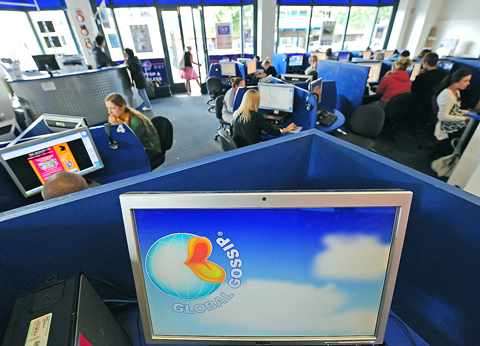The Australian government will build a A$43 billion (US$31 billion) high-speed broadband network, leading a new private-public company, after rejecting bids by companies that it said failed to offer value for money.
In a surprise move, Australian Prime Minister Kevin Rudd said yesterday the government would ask private companies to join the country’s biggest infrastructure project to build a network that would be up to 100 times faster than the current network.
Australia has slower and more expensive Internet services than many developed countries, raising concerns about competitiveness, but the project will be made more difficult by the country’s vast distances and inhospitable terrain.

PHOTO: AFP
“It’s time for us to bite the bullet on this. The initiative announced today is a historic nation-building investment focused on Australia’s long-term national interest,” Rudd told reporters at parliament.
The center-left government would sell its majority stake five years after the network, which still requires parliamentary approval, is fully operational.
The fiber-optic network, central to Rudd’s winning election campaign in late 2007, will be Australia’s biggest reliance yet on public-private partnerships and underscores Rudd’s preference for government intervention amid a bruising global financial crisis.
A consortium comprising wealthy Australian businessmen and telecoms industry veterans had been favorite to win the project ahead of Optus, which is owned by Singapore Telecommunications, and Canada’s Axia NetMedia.
The tender process was enveloped in controversy after the country’s largest phone company, Telstra Corp, was dumped from the running in December, after the government panel overseeing bids said its proposal did not fit requirements.
Rudd said the new network would be built with money from a A$20 billion national infrastructure fund and the sale of bonds, following an initial government investment of A$4.7 billion. Private sector investment would be capped at 49 percent.
It adds to A$78 billion in economic stimulus measures announced by the government since September to lift the stalling economy.
Rudd estimated building the network would take seven to eight years, presenting a risk that voters could be alienated by the long delay as the government faces re-election late next year.
“We’ve delivered an enhanced election commitment. We’re actually delivering faster speeds to more people,” Australian Communications Minister Stephen Conroy said, shaking off concerns that the scrapped tender could anger voters and big telcos.

MORE VISITORS: The Tourism Administration said that it is seeing positive prospects in its efforts to expand the tourism market in North America and Europe Taiwan has been ranked as the cheapest place in the world to travel to this year, based on a list recommended by NerdWallet. The San Francisco-based personal finance company said that Taiwan topped the list of 16 nations it chose for budget travelers because US tourists do not need visas and travelers can easily have a good meal for less than US$10. A bus ride in Taipei costs just under US$0.50, while subway rides start at US$0.60, the firm said, adding that public transportation in Taiwan is easy to navigate. The firm also called Taiwan a “food lover’s paradise,” citing inexpensive breakfast stalls

TRADE: A mandatory declaration of origin for manufactured goods bound for the US is to take effect on May 7 to block China from exploiting Taiwan’s trade channels All products manufactured in Taiwan and exported to the US must include a signed declaration of origin starting on May 7, the Bureau of Foreign Trade announced yesterday. US President Donald Trump on April 2 imposed a 32 percent tariff on imports from Taiwan, but one week later announced a 90-day pause on its implementation. However, a universal 10 percent tariff was immediately applied to most imports from around the world. On April 12, the Trump administration further exempted computers, smartphones and semiconductors from the new tariffs. In response, President William Lai’s (賴清德) administration has introduced a series of countermeasures to support affected

CROSS-STRAIT: The vast majority of Taiwanese support maintaining the ‘status quo,’ while concern is rising about Beijing’s influence operations More than eight out of 10 Taiwanese reject Beijing’s “one country, two systems” framework for cross-strait relations, according to a survey released by the Mainland Affairs Council (MAC) on Thursday. The MAC’s latest quarterly survey found that 84.4 percent of respondents opposed Beijing’s “one country, two systems” formula for handling cross-strait relations — a figure consistent with past polling. Over the past three years, opposition to the framework has remained high, ranging from a low of 83.6 percent in April 2023 to a peak of 89.6 percent in April last year. In the most recent poll, 82.5 percent also rejected China’s

PLUGGING HOLES: The amendments would bring the legislation in line with systems found in other countries such as Japan and the US, Legislator Chen Kuan-ting said Democratic Progressive Party (DPP) Legislator Chen Kuan-ting (陳冠廷) has proposed amending national security legislation amid a spate of espionage cases. Potential gaps in security vetting procedures for personnel with access to sensitive information prompted him to propose the amendments, which would introduce changes to Article 14 of the Classified National Security Information Protection Act (國家機密保護法), Chen said yesterday. The proposal, which aims to enhance interagency vetting procedures and reduce the risk of classified information leaks, would establish a comprehensive security clearance system in Taiwan, he said. The amendment would require character and loyalty checks for civil servants and intelligence personnel prior to